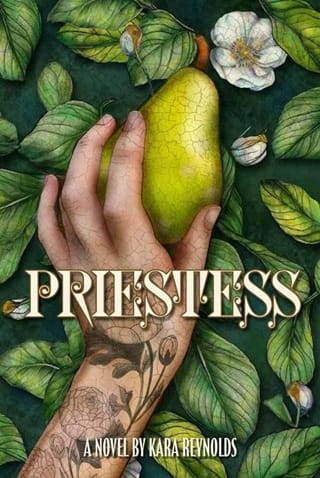5. Whispers
“Where is the transport wagon?”
the captain asked, his hands on his hips, staring at a line of public hitching posts on the side of the road.
Twenty gray horses with saddles and full saddlebags were tied along the posts, but there was no vehicle.
We had left the city along a broad dust road that led into one of the mining districts, joining the other units of Tintarian soldiers, their numbers spreading far on either side of us, all of them pouring from the Eccleston gates in formation.
Our company of ten on a wagon pulled by four horses and nineteen men on foot had fallen behind the cavalry and the infantry units marching at a fast pace.
“Those cavalrymen think everything is theirs,”
said one man with silver hair, despite him looking no older than Mischa.
“They always absorb other troops’ supplies into their own.
I know it was them.”
The captain’s shoulders drooped.
I could see he was fighting sleep.
“They know what our aim was.
They knew those were our grays. Why—”
“Because they’re bloody bastards,”
said the man with the shaved head, leaping off of the driver’s seat and walking over to one of the horses, cooing in its ear.
“The pig box was only supposed to be temporary,”
said the man called Perch.
“It can barely hold them all,”
said the silvery-haired man.
“Fletch, you are correct,”
said the captain, tonelessly.
Then, more to himself, “Everyone knows a Procurer rides a gray.
Would they not think that transport wagon was ours?”
“Next time, we will paint our name on the side,”
said the bald man walking away from his horse towards the captain.
“Thatcher,”
said the captain, stepping closer to the bald man, whose name must be Thatcher.
His voice was low, but I could still hear it over the sounds of the other Procurers damning the cavalry.
“You are like a brother to me.
And right now, like a brother, you are a thorn in my side, man.”
Thatcher’s back was to me, but I could tell he was smiling.
His voice was also low.
“Can you believe we’re taking nine women to Hinnom? He’s either going to be mad or laugh and, brother, I cannot wait to see what happens.”
“Do not speak your king’s name so familiarly.”
The leader’s voice was more tired than stern.
“You let us call you Alric.”
Alric, I thought.
That is what the man called Perch had said in the chapel.
For the past thousand or so winters, with the frequency of trade and the continued exploration of as-of-yet unclaimed lands, the continent had adopted a common tongue.
Only things written were penned in the language of their country, always providing translation work, as Mischa and I did, at the scriptorium.
So, while we could understand our captors for the most part, they did have customs and terms that would be completely foreign to us.
I had never heard the name or the word Alric.
“I,”
the leader was responding to Thatcher, still low-voiced, “am not one of the most powerful kings in the known world.
I have but nineteen who follow me.”
“The best nineteen,”
said Perch, the tallest one with the long hair, breaking away from the rest of the troop, all of them now offering feedbags to their horses.
“Do not overfeed them,”
said the leader, speaking over his shoulder.
“That has to last us.
I don’t know how much fresh grass we’ll encounter on the way back.”
“It’s spring.
We’ll be just fine,”
said Perch, pulling a piece of jerky from the inside of his breastplate and pulling off a hunk with his teeth.
He held the jerky towards Thatcher.
Thatcher took the jerky and pulled off a bite for himself.
He held it towards the leader.
The leader shook his head.
“That’s been in Perch’s shirts all day.”
“So?”
said Perch.
“It’s good luck also.
You know that, right? If the fates come for you in battle and they are hungry, it is an offering in place of your soul.
You’ve never been told that? Not by your parents growing up? Your training officers?”
He looked between Thatcher and the leader and I gathered that the two men had joined the army at the same age.
“Tastes fine,”
said Thatcher to the leader and then turned to Perch.
“No.
Our commanding officers were not dumb fisherman who can’t piss in the night without a talisman hanging off their prick.
Neither were Alric’s parents.
They’re blacksmiths who have to use common sense or they’ll burn themselves alive.
Just like I was raised by Helmsmen who taught me to be practical and bury my shit in the woods so as to not attract wolves, not to pray to the god of shit over my own shit.
No one else believes your nonsense.
Only dumb fishermen.”
Perch shrugged.
“Not one man in my family’s lineage has drowned because we respect that mortal man cannot understand the entirety of the world around him.
Also, even if it seems mad, it’s called having some bloody respect for traditions."
“Both of your language is appalling,”
said the captain, but not with anger.
I wondered at the relationship with him and the two men called Perch and Thatcher.
They seemed to have a bond outside of being Procurers.
And the leader, while not exactly indulgent towards these two, seemed to have a less formal air talking to them.
Bald Thatcher chortled.
“It’s the same language you sometimes use after drink.”
“Alric doesn’t get drunk when he drinks,”
said Perch.
“He just relaxes his arse—”
“Spare us,”
sighed the leader who now I understood to be named Alric and turned to walk up to one of the gray horses at the hitching posts.
I watched him put his hand on that horse’s forelock and his forehead against its cheek.
The two younger men who had been our guards in the chapel walked by.
I watched the handsome boy turn from his horse and look for Maureen in the wagon, find her sleeping with her head tilted against a wooden slat and pause briefly to look at her face more closely.
The one who had been stricter, named Tristan, did not look our way.
“Quinn,”
I said once Perch and Thatcher had joined their leader to care for their mounts.
“Did you hear that? I think a bigger wagon was waiting for them.
They were going to kidnap someone if not us.”
“Yes,”
she said.
“What that means I do not know, but it means something.”
After each soldier had mounted his horse and Thatcher had tied his horse to the back of the wagon, still wearing his saddle, we turned down the broad dust road as a faster unit.
This time, our four harnessed horses picked up a pace to match the mounted riders and despite the more even surfaces of the roads compared to the rock streets of Eccleston, the speed jostled awake the five women sitting.
The sun rose in the sky, the horizon blurred by smoke from Eccleston and I began to anticipate how hot it would get once it was at a higher point.
While it was spring and the air crisp, it was far enough past winter that the sun in midday was hot on the skin.
A question occurred to me.
“River, what’s the weather in Tintar like?”
She had been jolted awake but lit up when asked, again, for her input.
She must have been a pleasant tutor, imparting her exuberance to students.
“Much like Eccleston they have four seasons but each is more distinct than ours.
Since their empire is built along the continental coastline, their spring can be hot and humid and they have sea storms hit their port towns.
Their summer is even more hot and humid, it even gets warm in the north close to their mountain range.
Fall is the only pleasant season I have heard because it is mild weather and they brew a lot of their drink in that season.
There are many celebrations for their religion.
And then their winter comes on strong and it is short but bitter.
Even dangerous to travel.”
“What’s the capital of Tintar called again? Is that where they’re taking us? That has to be it.
If they’re actually going to do what Edie suggested and try to barter for a renewed trade agreement by holding us for ransom.”
Mischa asked.
“How disappointed they will be,”
said Eefa, bitterly.
“Keep your voice down,”
Catrin gasped.
“Don’t tell me what to do,”
responded Eefa.
“Girl, be at peace,”
admonished Bronwyn.
“She doesn’t want you to expose us.”
“What does she have to worry about?”
replied Eefa, but this time in a lower register.
“She is a Tigon.
They will actually pay Tintar to get her back.”
The petulant girl was likely right.
“We have to take it hour by hour,”
I piped in before Catrin, looking hurt, responded to Eefa.
“We don’t know what they will do and we cannot begin to know.”
Helena and Quinn nodded as I spoke.
“Wondering will drive us crazy.
Let us focus on learning everything we can about these men and about Tintar.
And we should try to listen to their conversation when we can.”
“I can recite everything Tintarian I can think of,”
volunteered River.
“Yes,”
said Helena.
“River can tell us about their culture.
We’re not in Eccleston anymore.
That’s a good idea.
And it will occupy us.”
“The more we know, the more equipped we are as we decide what we should do.
Perhaps the attempt to escape will even present itself.”
“When did we put her in charge?”
sulked Eefa.
I opened my mouth more out of shock than wanting to say anything.
“I do not know,”
said Quinn.
“I guess I started taking her seriously when she thought to dress us up as priestesses so those superstitious murderers would spare us.”
“And when she put herself in front of us and faced down twenty swords,”
said River.
“Edie just seems like she should be in charge,”
murmured Catrin, looking towards me.
Her smile was trembling and I thought how especially scary this must be for her, having grown up in wealth and security.
“She is in charge at the scriptorium.
She is the head scribe,”
explained Maureen.
“I don’t want to be in charge,”
I said.
“I just don’t want us to buckle under our fears.
Now is not the time for panic.
I want us to find a solution to this.
I want us to survive.”
“Yes.
That is the plan,”
said Bronwyn to her daughter.
“We survive.”
A look passed between them, Eefa looking angry and Bronwyn looking defeated.
“Eefa, how old are you?” I asked.
“Sixteen. Why?”
I gestured towards Maureen.
“And Maureen is seventeen.
If they ask, both of you need to tell them you have reached your majority.
Priestesses are not often children.”
“I’m not a child,”
said Eefa.
“She means in a legal way, girl,”
said Bronwyn and there was a note of desperation in her voice that had naught to do with us being prisoners of war.
“There’s teenage girls for you,”
Helena said to me, her mouth against my ear.
Under the sound of Bronwyn and Eefa talking, I turned to her, “Well, you have it a little easier with our girl.”
I nodded towards her daughter who was backing up Bronwyn saying, “Eefa, it will just lead to less questions for you and me.”
Helena exhaled and turned her face full towards mine.
“I am worried about her.
She is comelier with every day.”
“Yes, my niece is a beauty.”
“And so are Catrin and Mischa.
And so are you!”
“Do not count yourself out.”
She tried to look amused, but I could tell she was also trying not to cry.
I made myself accept the serious mood she wanted to take then.
“It is as I said in the chapel.
They are religious men.
Because of our alleged religious office, I do not think they will have their way with us.
It would be sacrilegious.
If we find ourselves at the worst, I will offer them myself to save Maureen.
As would Mischa.”
Helena’s eyes began to shine.
As the sun rose higher, I could more clearly make out my friend’s elegant bone structure and warm, brown eyes.
I continued.
“She is like the daughter I will never have.
It has been an honor to be your friend all this time and twice as much one to be a part of her growing up.”
“You don’t want us to buckle under fear, but you’re making grand speeches.”
I said, “I’m sorry.”
“Don’t apologize.
Without you, we’d all be dead.
But I am scared.”
“I have felt like pissing myself all night.
I’m quaking in these boots.
Boots that will be hot in about four hours.
I already feel so grimy and I doubt we’ll be bathing soon.
This is absolutely terrifying.
For many reasons.”
“What are you whispering about?”
Mischa grumbled, stepping over a still drowsy sitting Maureen.
She looked towards Quinn telling River and Catrin they had not missed anything happening while they slept.
Bronwyn and Eefa were still quarreling but it was subdued, both of them still sleepy.
Turning back to us, she said, “Did you hear those men talking? They were planning on kidnapping someone just not us.”
I nodded.
I wanted to tell my two closest companions about what Quinn and River and I had discussed but Helena had just said she was scared.
I would tell them soon, when we had all fully accepted our state of captivity.
 Fullepub
Fullepub 



